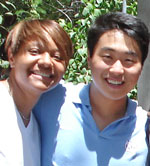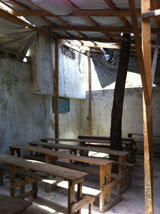On the ground in Haiti: Gillings School students integral to relief effort
| November 30, 2012 | |
|
When one door closes, open another.
That was Alicia Stokes’ mantra when the University had to cancel her trip to Haiti. Stokes, an executive master’s candidate in health policy and management at the Gillings School of Global Public Health, had been selected from approximately 100 applicants to take part in an extended relief effort in the small, disaster-riddled country. At the last minute, the University decided the particular trip abroad would be too great a risk.

Alicia Stokes (left) and Andrew Koo, in Haiti

Dominique Dormeville
When that happened, Stokes partnered with undergraduates Andrew Koo and Dominique Dormeville and recent alumnus Alex Christian to find out how to get to Haiti on her own. The four of them worked with experts at UNC and Duke to form their own organization, the Student Impact Project. Their mission, to help Haitians help themselves, led them to focus on developing a sustainable health system, particularly for women and children. They also wanted to provide educational aid to children in grades one to 12.
Last spring, Christian and Dormeville paid their own way for a four-day needs assessment trip to Haiti.
“We quickly learned that Haiti has no infrastructure, and few laws and police powers,” Stokes said. “We felt compelled to return to help make a difference for the Haitian people.”
Back in Chapel Hill, the group redoubled its efforts to obtain necessary travel approvals from the University. After much planning and paperwork, the Student Impact Project officially began.
After collecting and packing medical supplies, the group left for a two-week trip in early August. For Stokes, it was a special trip in many ways – not least because it was only her third time on an airplane and the first time out of the United States.

The Student Impact Project team also hopes to obtain ongoing sponsorship for College Alain Clerie, a school that had been destroyed by the January 2010 earthquake in Haiti. The school is being used again, but the collapsed roof has been replaced with leaky tarps.
The project team traveled to an orphanage three hours north of Port au Prince and set up a mobile health clinic, where they examined about 40 children and nearly 200 other people who subsequently arrived to receive medical services. The students saw patients from 8:30 a.m. to 10 p.m. “One frequent complaint of the people we saw was dizziness,” Stokes said. “When we examined them, we found almost all of them had water in their ears. We were concerned they were using too much water and that it wasn’t clean. They also were not using cotton swabs to clean and dry their ears.”
Stokes said she learned a great deal from her experience in Haiti and was pleased to apply what she had learned in the classroom to help the Haitian people.
“In the executive master’s program classroom,” she said, “students define a problem, explore the possible lead causes and consider how to help change behaviors or root causes of the issue. When we return to Haiti in early 2013, we want to educate more about ear hygiene and suggest ways Haitians can take better care of themselves.”
What comes next for the Student Impact Project? The group members will present their ideas and plans to several U.S. organizations in an effort to raise funds for their work in Haiti. They hope to take eight or nine students on their next trip and eventually to establish five sustainable mobile health clinics in Port au Prince or northern Haiti.
“I am so proud to be a part of this relief effort,” Stokes said. “Our work will have a significant and immediate impact, and hopefully a long-lasting positive effect, as well.”
Read more details of the trip here.
UNC Gillings School of Global Public Health contact: David Pesci, director of communications, (919) 962-2600 or dpesci@unc.edu.
|
|
